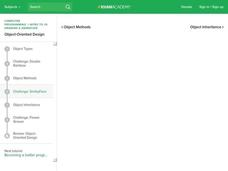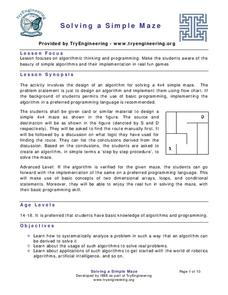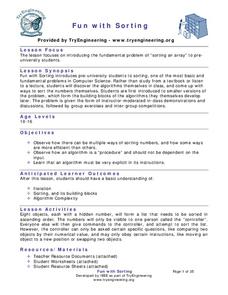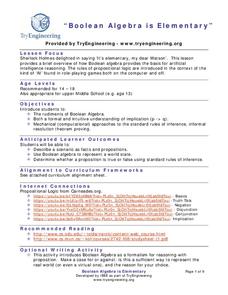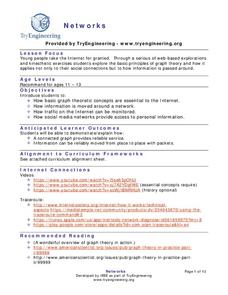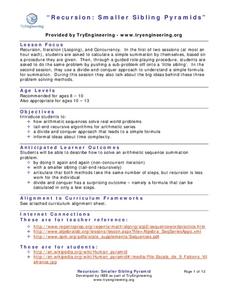PBS
NOVA Cybersecurity Lab Game
It's important to protect yourself online. An online game has pupils imagine themselves as cybersecurity specialists at a social networking company. They learn about ways to protect data online through a series of challenges.
DiscoverE
Dream Big Robot Challenge
Think like a human, act like a robot. Scholars program a human robot to travel through an obstacle course. One member of the team then becomes the robot and acts out the code. Hopefully, this human robot will make it through the course!
DiscoverE
My Friend Robot
Can you do better than a robot? Teams write instructions for a hypothetical robot to build a structure. They test their instructions by acting them out to see if they produce the desired structure.
DiscoverE
Coding Without Computers
See what it feels like to be a robot. Scholars use programming vocabulary to program a human robot and test out their codes by acting them out. The code should result in stacking six cups into a pyramid.
Institute of Electrical and Electronics Engineers
Public Keys, One Way Functions and Hard Problems
Use paint to teach about cryptography. Scholars explore public key cryptography by attempting to mix a secret color using paint. After the activity, they investigate the Diffie-Hellman method using prime numbers, exponents, and modular...
Learning to Code Through Gameplay and Exploration 12-week Rotation for K-2
Through collaborative gameplay, students will learn the basic logic and sequencing concepts of coding. This process will also develop their skills in computational thinkingand problem solving.
Think Like A Programmer! Puzzlets Cork the Volcano Curriculum
Common Core Standards Connected
The standards listed below are standards from the Common Core Framework which map to learning opportunities with Cork The Volcano & Puzzlets.
Source Link: http://www.corestandards.org/
Grade...
Khan Academy
Challenge: SmileyFace
Two smiley faces are better than one. The interactive lesson challenges pupils to use methods to alter a program to make it more efficient. Individuals use the new code to create multiple smiley faces that speak. The engaging activity is...
Khan Academy
Challenge: Double Rainbow
Draw a rainbow over the rainbow. The second segment in a series of six has the class practice using functions to edit a program that draws a rainbow. After creating the function, the interactive lesson challenges pupils to create another...
Code.org
Minecraft Hour of Code
Devote an hour to computer coding ... it's time well spent! The activity has young computer scientists write code to solve puzzles in the Minecraft game. They learn how to apply block codes and repeat loops.
Davis School District
Computer Parts
What is inside a computer? Give your budding computer scientists a worksheet that has them label parts of a computer. They use a link included on the sheet to label basic input/output systems, video cards, drives, case fan, and more....
Khan Academy
Challenge: Flower Grower
How does the garden grow? With inherited functions! The interactive activity has individuals alter a program to utilize object inheritance. Scholars develop an object type that two other objects use to inherit similar aspects. The...
TryEngineering
Solving a Simple Maze
Solve a maze ... from a robot's point of view. In the instructional activity, your scholars build a small, simple maze from cardboard and then find a route from the start point to the finish point. They write an algorithmic process that...
TryEngineering
Fun with Sorting
Who knew sorting could be so much fun? Scholars participate in a sorting activity where they develop questions to place a list of numbers in order. They consider how these questions can be used as an algorithm.
TryEngineering
Computing in the Cloud
What and where is "the cloud"? The lesson teaches scholars about the history of cloud computing and about its current uses. It also teaches how to install a multiple guest OS in a host OS and how to use cloud computing services.
TryEngineering
Arduino Blink Challenge
Who knew turning a light on and off could be so complicated? In the instructional activity, pupils use Arduino boards to learn about computer codes and programs. They program an Arduino to make a light turn on and off at certain time...
TryEngineering
Program Your Own Game
Young computer scientists get to see what it's like to be a software engineer as they use free online software to design a computer game. They play and evaluate games groups created to round out the activity.
TryEngineering
Boolean Algebra is Elementary
See how Boolean algebra relates to video games with a lesson that teaches young scholars how to use Boolean algebra to create rules for a virtual world. They test the rule base for consistency in groups.
TryEngineering
Graphics: Bits and Points
What can a mural teach pupils about computer science? The activity has scholars create a mural on a wall to learn about bitmap and vector graphics. Along the way, they learn about the graphics coordinate system.
TryEngineering
Networks
Ever wonder how the Internet works? The lesson teaches scholars the basics of graph theory and how it applies to the Internet. They perform simulations to see how information is sent on the Internet.
TryEngineering
Recursion: Smaller Sibling Pyramids
Get siblings to do your work. Scholars learn how to perform summations of arithmetic sequences in an innovative lesson. They use iterations, smaller siblings (tail-end recursion), and the divide-and-conquer approach.
TryEngineering
Search Engines
Introduce search engines with an activity that models how search engines work and the different algorithms they employ. Working in groups, class members then build search queries to demonstrate the knowledge learned.
Teach Engineering
Automatic Floor Cleaner Computer Program Challenge
Have your class use the engineering design process to program a vacuum robot. Using computer engineering concepts, teams program an automatic floor cleaner to traverse designated patterns.
Computer Science Unplugged
Treasure Hunt—Finite-State Automata
Introduce your class to the concept of finite-state automata with an activity that asks individuals to try to map their way to Treasure Island by taking different routes though an island chain. Each island has two ship sailing to...









